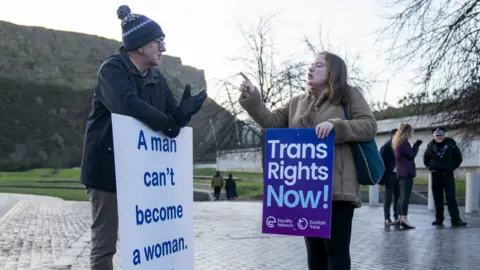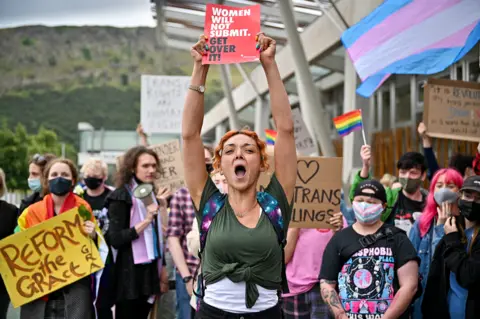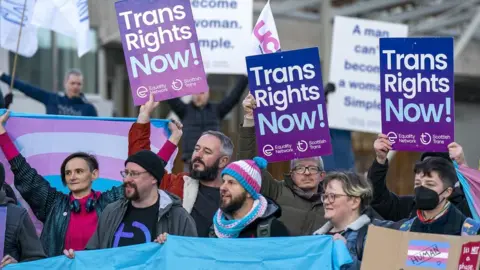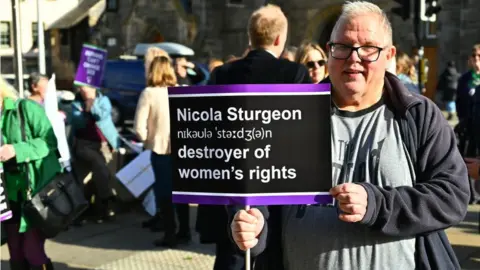Scotland Gender Recognition Bill: What are the sticking points?
 PA Media
PA MediaThe UK government's decision to block Scotland's gender law reform is historic. It is the first time a Section 35 order - which allows Westminster to prevent something the Scottish Parliament has voted for to become law - has been used.
Scotland wants to make it easier for people born there, or classed as "ordinarily resident", to obtain a Gender Recognition Certificate (GRC). This is a document that changes someone's legal sex on their birth certificate and also means marriage certificates and death certificates will carry the gender they identify as.
The reforms would speed the process up and lower the age people can apply to 16. This would put Scotland on a different path to the rest of the UK.
The Westminster government says this could have a "serious adverse impact" on existing laws in the rest of the UK. Scotland's First Minister has accused it of a "direct attack" on devolution.
So what are the sticking points?
The impact on equality law
Gender recognition is devolved which means Scotland can make changes to the law as it affects people in Scotland.
But there are concerns that some of the consequences of doing that could impact wider equality legislation, which is what is referred to as a "reserved" matter and outside of the Scottish Parliament's competence.
A High Court judge in December said that a GRC changes someone's legal sex for the purpose of the Equality Act (2010).
This law is designed to protect people from being discriminated against because of certain characteristics, which include sex or gender reassignment.
There are exceptions where certain spaces can exclude transgender people if there is a "legitimate aim" to so.
These exemptions can be made if there are privacy or safety concerns, for example access to a domestic abuse refuge.
 Getty Images
Getty ImagesScottish ministers insist that their reforms have no impact on equality law.
Scotland's social justice minister Shona Robison said that transgender women can be excluded from "a female only space whether or not they have a gender recognition certificate".
However, critics say that this remains an "untested" area of law.
Discrimination solicitor Audrey Ludwig argues that self-identification under Scotland's proposals would change legal sex for an "indeterminate, significantly increased number of people" and that service providers may "find it harder to justify excluding someone".
 PA Media
PA MediaDifferent rules on either side of the border
Critics argue that if Scotland's GRCs aren't recognised in the rest of the UK then there could be a situation where if a person who has one crosses the border, then their legal sex could be different - creating a particular problem for schools and employers.
One potential difficulty, lawyers suggest, could arise if a 16-year-old living in Scotland has a GRC, but attends single-sex classes at school in England. In such a case, it would be complicated for teachers to know which class to place them in, it's suggested.
Barrister Amanda Jones, who specialises in public law, describes a "nightmare complication" that if a person living in Scotland has changed legal sex there, but in the rest of the UK is recognised under their birth sex, it would make the implementation of the Equality Act anywhere in the UK "extremely complicated".
Some are calling for the Equality Act to be made clearer and define once and for all whether the protected characteristic of sex means legal sex or biological sex.
The UK government says the reforms would create "two parallel and very different regimes for issuing and interpreting GRCs".
It highlights the potential impact on UK-wide IT systems which manage tax and benefits and says "IT infrastructure only allows one legal sex on any record and cannot change the marker for 16 to 17-year-olds".
It says building a dual system, to take account of Scotland's reforms, "may be unmanageable".
Concerns about fraudulent applications
Currently in Scotland, about 25-30 people per year are given GRCs.
Scottish ministers estimate the numbers could increase 10 times to 300 a year, based on data from other countries which have similar self-identification processes.
Scotland's reforms would simplify and speed up the GRC process. No diagnosis of gender dysphoria or medical reports would be required, and the period in which applicants need to have lived in their acquired gender would be cut to three months, or six months for under 18s.
The UK government says it "does not believe that the [Scotland] Bill retains or creates sufficient safeguards to mitigate the risk of fraudulent and/or malign applications and believes that the reformed system will be open to abuse and malicious actors".
But the bill does create an offence of making a false application for gender recognition, with penalties of up to two years' imprisonment and an unlimited fine.
 Getty Images
Getty ImagesWhat happens next?
Even if the bill had received Royal Assent it was unlikely to have become law until the end of this year but a Section 35 order has put a screeching halt to it.
It means those wishing to change their legal sex will continue to follow the processes that have been in place for 18 years.
The Secretary of State for Scotland Alister Jack appears to have left the door open for Scottish ministers to take the bill back and make amendments to it but if the First Minister's response is anything to go by, this debate could well play out in the courts.
At the heart of it are two groups of people who want their rights protected, those within the transgender community and women who want to ensure their access to single-sex spaces isn't compromised.
It's this fine balance that will be the subject of intense scrutiny against the backdrop of a big constitutional row playing out between Holyrood and Westminster.
